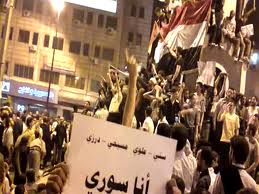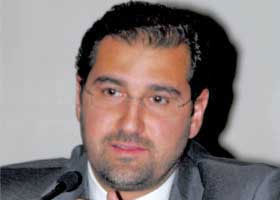
In the face of overwhelming odds, the popular revolt against the Assad regime continues. Many hundreds have been killed, and thousands more, maybe tens of thousands, have been rounded up. Yesterday, tanks shelled residents in Homs, Syria’s third largest city, and protest continues in half a dozen or more towns across the country.
As is the wont of authoritarian regimes in such situations, the government blames the disturbances on “terrorists” and foreign interference. Nothing could be further from the truth. What is happening in Syria, like events earlier this year in Tunisia, Egypt, Libya and elsewhere in the Arab world, is a domestic uprising against decades of repressive and increasingly corrupt rule by an unrepresentative clique.
For that reason the West should bring to bear everything in its power, starting with the severest possible sanctions against members of that clique, to pressure the regime to halt the violence against its own people. But that power is limited. Libyan-style military intervention by Nato would risk conflagration across the Middle East. There is no quick external fix to the Syrian crisis, and in the short-run, the crackdown may well succeed.
As far as can be judged, the opposition is unarmed and fragmented, while no visible fissures have opened up in the Syrian security forces who, in contrast to their counterparts in Egypt, have no qualms about opening fire on the people they are supposedly there to protect. Not unlike Iraq, Syria is a mosaic of tribes, sects and interest groups. The Assads will play on these divisions to survive, and their determination to survive is beyond all doubt.
 In an interview yesterday with The New York Times, Rami Makhlouf – Syria’s most powerful businessman, a first cousin of President Assad and an emblem of the corruption and economic injustice which fuels the protest movement – spelt that determination out. The regime was treating the protests as “a fight to the end” and, he warned, “when we suffer we will not suffer alone”. Such is the argument of dictators throughout the ages: “Après nous, le déluge.”
In an interview yesterday with The New York Times, Rami Makhlouf – Syria’s most powerful businessman, a first cousin of President Assad and an emblem of the corruption and economic injustice which fuels the protest movement – spelt that determination out. The regime was treating the protests as “a fight to the end” and, he warned, “when we suffer we will not suffer alone”. Such is the argument of dictators throughout the ages: “Après nous, le déluge.”
Indeed, Mr Makhlouf (who is already specifically targeted by both US and EU sanctions) went into specifics. Without stability in Syria, he declared, “there’s no way there will be stability in Israel” and “no one can guarantee what will happen” should the Assad regime go under. Up to a point, he is correct. In the turbulent geopolitics of the region, Syria counts in ways that Libya, even Egypt, do not. It is part of the alliance between Iran and the radical groups Hezbollah in Lebanon and Hamas in Gaza that allows Tehran to make so much mischief. Chaos in Syria would probably wreck the ever-precarious balance in Lebanon.
Yet precisely because the regime in Damascus has seemed so stable, many policymakers in both the US and Israel see President Assad as the best hope of securing a Palestinian settlement. They have continued to do so less in the belief that he is a reformer – that illusion disappeared well before the current crackdown – than that Mr Assad and his clique will calculate it is in their own interest to play that role.
And indeed, this massive domestic challenge may make the President more inclined to strike a deal, although no one can be sure. Mr Makhlouf’s bluster, however, omits one crucial point. Today’s turmoil is causing huge damage to the Syrian economy, damage that will continue even if the revolt is quelled. All Mr Assad will have won is a little more time to make the genuine and sweeping social and economic reforms that alone can dig Syria from the terrible pit into which he has plunged it.
Photo: Syrian anti-regime protesters waving their national flag and holding a sign that reads in Arabic “Sunni, Alawi, Christian, Druze, I am Syrian” during a demonstration in the central town of Homs

Leave a Reply
You must be logged in to post a comment.